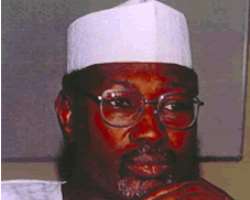A CHALLENGE FOR THE PHYSICALLY CHALLENGED

As the preparations for the 2011 general election gathers momentum, physically-challenged Nigerians say their votes must be counted. NDUBUISI ORJI writes on their agitations for a friendly environment that will enable them exercise their franchise.
It was an uncommon political gathering. A gathering of the physically-challenged- the blind, cripple, the deaf and dumb and lepers. They came together to ruminate on how they can be active participants in the 2011 general elections.
The political summit of the physically-challenged community was facilitated by Transform naija, a Non-Government Organisation (NGO) and venue was the National Stadium, Surulere, Lagos State.
One after the other, people with various forms of disability expressed fears about the 2011 elections. For them, it was the exercise of their fundamental human rights especially in a democracy. Democracy is about freedom. Freedom of expression; but more especially freedom by an individual to choose the person or persons that will rule them. Consequently, they believe that the physically challenged persons have the inalienable rights to be part of the next election, especially as it concerns voting for leaders of their choice.
For Mr. Opeoluwa Akinola, chairman, Nigeria Association of the Blind, Lagos State chapter, the physically challenged persons fulfill all their civic responsibilities as their able bodied counterparts. But when it comes to the all important and sensitive issue of voting, they are either out rightly excluded or the environment makes impossible for them to participate in the process.
Akinnola said it must stop. 'Firstly, we have performed all our responsibilities and we see our voting as part of our responsibility that is being taken away from us. Now what we want from the government is to create an environment in which we have access to materials for the electoral process. '
He cited the language of the section 56 of the Electoral Act 2010 that deals with disabled persons as potential obstacle to their participation in the 2011 election. According to section 56 (2) of the Electoral Act 2010 ' the Commission may take reasonable steps to ensure that voters with disabilities are assisted at the polling place by the provision of suitable means of communication…'
Akinnola opines that the 'may' in that section should be immediately changed to 'shall', so that it becomes compelling for the electoral body to provide a conducive and enabling environment for his people to participate in the elections.
Besides, ' We are not sure if our mandate has not been taken away from us, when somebody helps you to cast your vote. They made another provision that we can come out with someone to assist. Even at that, the person may not belong to the same party with me. We have presidential and governorship candidates. We may have the same presidential candidate and not the same at the governorship level. And that person may short change me in terms of casting my vote,' he explained.
'They should provide a way so we can cast our votes ourselves. Not being represented by somebody else. We are Nigerians, we are ready to be productive, and we are ready to participate in the process. We are ready to even contest election, to hold postings when necessary, and put our best into it. We are educated and are computer literate, we are only asking for what will make this country fair to all concerned. There is only one way we can make Nigeria grow and participate in nation building and electoral process is part of nation building.'
Mr Danlami Basharu, National President, Joint National Association of Persons with Disabilities (JONAPWD) concurs. He said it is unfortunate that there is very little or no mention of people with disability in the 1999 constitution.
'The political process has consistently ignored the full participation and inclusion of over 10 per cent of the Nigerian population of persons with disabilities who form a significant segment of the Nigerian nation,' he lamented.
Basharu said people with various forms of disabilities have been clouded out of the election process. According to him, ' there are no signs or language interpreters at the registration or polling booths; electoral materials are not in Braille and not accessible to the blind. Amputees and leprosy survivors are disenfranchised because the are not able to cast their votes due to the absence of some fingers.'
One of the facilitators of the summit, Ngozi Iwere, Director, Community life project said the demand of the people living with disability in Nigeria is clear. She told Daily Sun that all they want is to be active players in the democratic process. 'The demands of the people with disability in Nigeria are clear. They want to make sure that in the voters registration itself when they are capturing the data of the person who had come to register, it should not only capture the age and sex; rather there should be a space for the disabled and the kind of disability. They should ask what kind of disability they have? And it should be indicated. That way INEC will know that in a given centre people with disability will be coming to vote. And so they can make sure that the place is assessable
The physical challenged has made their point and demand. It is now left for INEC to decide what to do with the demands.
